Today more than ever, business owners around the world are investing time and resources into optimizing and improving their business efficiency. After all, time is money, and an efficient business can produce more within shorter timeframes.
But recent statistics show that over 75% of businesses operating in the US are negatively affected by their employee’s time theft schemes — which account for the most common type of time fraud, embezzlement, and occupational abuse.
Sporadic episodes of time inflating and buddy punching might seem negligible at first. But stealing time at work can be considered a crime similar to other employee theft, such as stealing money or equipment, which means potential criminal charges. So, what happens if you steal time at work? Here is all you need to know about what stealing time means and what happens if you get caught stealing time at work.
Note: If you’re an employer looking to eliminate all forms of time theft from your company, we highly recommend you use time and attendance software to monitor employees. Buddy Punch is a time tracking app we designed to maximize employee productivity and cut down on time theft throughout the workday.
What Happens If You Steal Time at Work?
Simply put, if you steal time at work, your employer could terminate your employment and ask for compensation for the loss of resources. Since time theft can be on a par with other types of employee crimes and occupational abuse, employees caught stealing time will be required to repay their employee for the financial damages caused, i.e.: they will have to return the payment received for the time they didn’t work.
That said, the Fair Labor Standards Act (FLSA) requires that employees be fairly compensated for all hours worked. Refusal to pay an employee for the time they’ve worked is known as wage theft, the opposite of time theft. The difficulty begins when there’s a dispute over employee hours – how much time is accurate, how much time is stolen? Though time theft is not a criminal offense punished by jail time (making law enforcement unlikely to get involved), the consequences of time theft can quickly become a huge legal hassle. Thus, some employers might opt out of the fight entirely despite catching an employee red-handed in the act of falsifying time records.
However, other more tech-savvy employers might instead turn towards introducing monitoring software into the work environment to help them identify and document all types of time theft.
While new regulations impacting full-time work might affect time theft in the future, today, there are no federal employment laws that outline what repercussions an employee caught stealing company time will face. Ultimately, in most cases, disciplinary procedures will depend on your employer’s policies and approach (usually outlined in the employee handbook).
What Does Stealing Time Mean?
Bottom line: employee time theft is defined as an employee being distracted, absent, or unproductive during the time they are paid for by their employee.
According to recent studies, nearly 45% of employees admit to clocking in or out a few minutes before or after their scheduled break time or shift start. Exaggerating the number of hours of work might seem an innocent practice at first, but new estimations show that this occupational abuse can cost companies over 7% of the yearly payroll. The smudging of time data makes it harder to calculate true labor costs, which in turn hampers a business’s ability to optimize and grow.
This kind of occupational abuse is far more common among hourly employees rather than salaried employees.
Disclaimer: things get more serious in the case of public government employees. They alone can face more serious repercussions for violating a time theft policy. These people will be looking at misdemeanor or felony charges, and will have to seek out a criminal defense lawyer. Much worse than simple legal action in most other scenarios.
But what are ways employee steal time? And what are the actions that could be condemned by employers?
Ways in Which Employees Commit Time Theft
Time theft can happen in a variety of ways. For your company’s HR department to assess the scale of the issue it is essential to carry out an accurate investigation into the habits of employees. Here are just some of the ways in which employees steal time:
- Inflating their timesheet by punching into time card apps several minutes before starting work or waiting after their shift has ended to punch out.
- Buddy punching occurs when employees clock in for a colleague or other worker on their behalf. This often happens if an employee is running late or is planning to be absent for the day.
- Taking extended breaks can be seen as time stealing if the employee claims to have worked the time in which they were actually on a break (including smoke breaks and unauthorized lunch breaks). Make sure to review the legislation and internal policies regarding breaks to understand what you are entitled to.
- Using work time to work on personal tasks, such as spending time on the internet or on social media, can be considered time theft. Other personal activities that fall within this category include making personal calls, scheduling appointments, checking personal emails, or working for another employer.
Distractions (such as time on social media platforms and non-work-related conversations) can represent employee time theft.
Can You Get Fired for Time Theft?
If you are wondering whether you can get fired if you are caught stealing time at work, the answer is probably. Today, there are no state or federal laws that define what disciplinary actions employees stealing time should face for their transgression.
However, each company will have its own set of internal rules and clear policies that can tell you a lot about what to expect from getting caught stealing time at while at job sites. Check with your human resources department if you’re unclear.
Thanks to today’s easy time clock software for small businesses, employees have a real-time tool to register accurate work hours, prevent buddy punching, and eliminate time theft. However, it is still difficult for employers to prove that your reported hours are inaccurate. Nonetheless, in a substantive case, your employer might file a lawsuit against you and face attorney fees to prove the theft of company money and time.
We consider our own software, Buddy Punch, to be one of the best tools on the market when it comes to cutting down on time theft. But we’re not the only ones. As of this writing, Buddy Punch has a rating of 4.8 out of 5 stars with 850+ reviews on Capterra (a popular software review site).
One of the best parts about Buddy Punch is that even though it works on Desktops and Smartphones, it’s easy to use for even non-tech-savvy employees. This means it’s unlikely to negatively impact employee morale.
What Happens if You Get Caught Stealing Time at Work?
If you get caught stealing time at work, you might face a range of disciplinary procedures and negative consequences — from pay restitution to demotion. Here are some of the most common actions most employers will take against employees stealing time.
- Reduced pay or salary docked by the time you are caught spending on something else rather than work
- Increased labor management and oversight
- Demotion or pay decrease
If your time theft scheme has caused substantial damages or has been going on for several weeks, your employer might also decide to put you on probation or suspend you. In the worst-case scenario, you might see your employment terminated. Depending on how this is handled, it’s possible that you might want to seek out a defense attorney for legal advice.
How to Avoid Accidentally Stealing Time at Work
While most of the time theft schemes are intentional, employees might run into trouble because of some mistakes. If you are looking to avoid time theft incidents, you should consider:
- Speaking to your employer about the issue: Employers know that their employees are the company’s most important aspect. If they notice a drop in productivity and low morale, they might introduce solutions such as better work-life balance, increased pay, and development opportunities. Don’t forget that, in most cases, happy employees equal less absenteeism and time theft episodes!
- Review your company’s policies: Be clear on what your company expects from you and what the potential repercussions of stealing time at work might be. These policies will also outline what the company considered time theft.
- Ask for time clock software that fits the company’s needs: Work from home is here to stay, and companies should adapt to this new way of working. If you or your colleagues are struggling to keep up with clocking in or out, consider asking your employer to introduce a solution suitable for remote employee time tracking or an industry-specific solution like a construction time card app.
How Buddy Punch Prevents Employee Time Theft
Time theft occurs whenever employees receive pay for work they didn’t do, and with such a broad definition, it shouldn’t be surprising that multiple practices fall under that umbrella.
Precisely because the methods vary, it’s difficult to implement a one-size-fits-all solution to prevent employee time theft. Today, we’ll focus on how our time tracking software Buddy Punch can prevent some common types of time theft, including:
- Buddy punching: This is when an employee clocks in or out for another employee. For example, if an employee is going to be late for work they may text a co-worker to clock in for them.
- Absentee punching: This is when an employee clocks in despite not being at work.
- Unrecorded breaks: This is when an employee doesn’t clock out for breaks; closely related are extended breaks, where the employee is off-duty for longer than their allotted break. In other words, despite being on the clock, employees are engaging in personal activities like phone calls, personal email, smoke breaks, or online shopping.
- Rounding payroll: This is when an employee arrives late or leaves early but rounds their login or logout time to receive credit for the time they weren’t working, sometimes due to a lack of clear policies.
- Unauthorized overtime: This is when employees’ work time exceeds their regular hours without prior approval, which can be considered time theft since overtime pay is greater than regular pay.
- Inaccurate timesheets: This is when employees — either deliberately or by accident — submit timesheets indicating they worked more hours than they did.
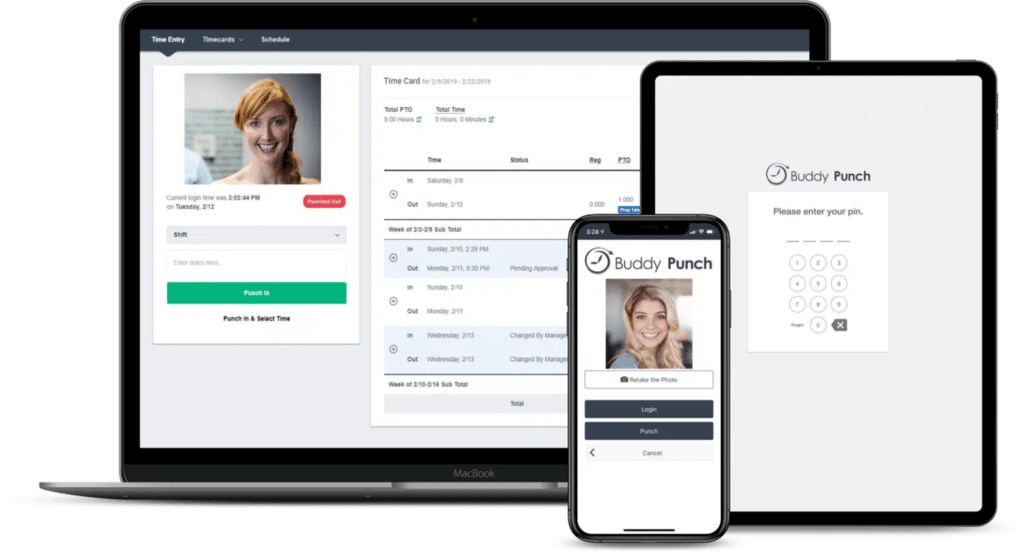
Buddy Punch is a cloud-based time tracking software that helps you effectively reduce or prevent employee time theft.
Buddy Punch does this by:
- Making it easy for you to create and share schedules. Employee time theft can be accidental, such as showing up to work and clocking in an hour early. The first step to reducing time theft is making sure everyone on your team is aware of the schedule. The second is to follow staffing requirements and honor employee availability.
- Making sure employees track their time accurately. Improper record keeping is a major source of employee time theft, both accidental and intentional. Employees can clock in too early, clock out too late, forget to record breaks, and so on.
Buddy Punch is a user-friendly time tracking system that keeps your employees accountable and your records accurate. This way, when it’s time to pay your employees (which you can also do through Buddy Punch), you know you’re paying them exactly what they’re owed.
Plus, Buddy Punch is compatible with all types of smart devices (e.g., smartphones, tablets, and computers), ensuring there are multiple ways employees can clock in. Its integrated accountability tools ensure real-time, accurate timekeeping of employee hours and employee attendance.
Our software is a user-friendly solution to time theft that can be tailored to both in-person and virtual workplaces. You can sign up for a free 14-day trial or request a one-on-one demo.
You can also keep reading for a more detailed breakdown of how Buddy Punch prevents specific types of time theft.
How to Prevent Buddy Punching and Absentee Punching
Buddy punching refers to employees signing in for another co-worker. It’s a common type of time theft, and can happen because an employee needs someone to start or end their shift for them.
When workers log their time via virtual systems such as apps or online shared spreadsheets, they can cut out the middleman necessary for buddy punching and sign themselves in despite not being at work. Alternatively, they might go to work, sign in, and then leave. Both are referred to as absentee punching.
Even increments of a few minutes here and there can affect your bottom line by snowballing into inflated labor costs; so Buddy Punch has three attendance software tools to prevent buddy punching and absentee punching:
- Photos on Punch
- Geofencing
- IP Address Locking
Photos on Punch
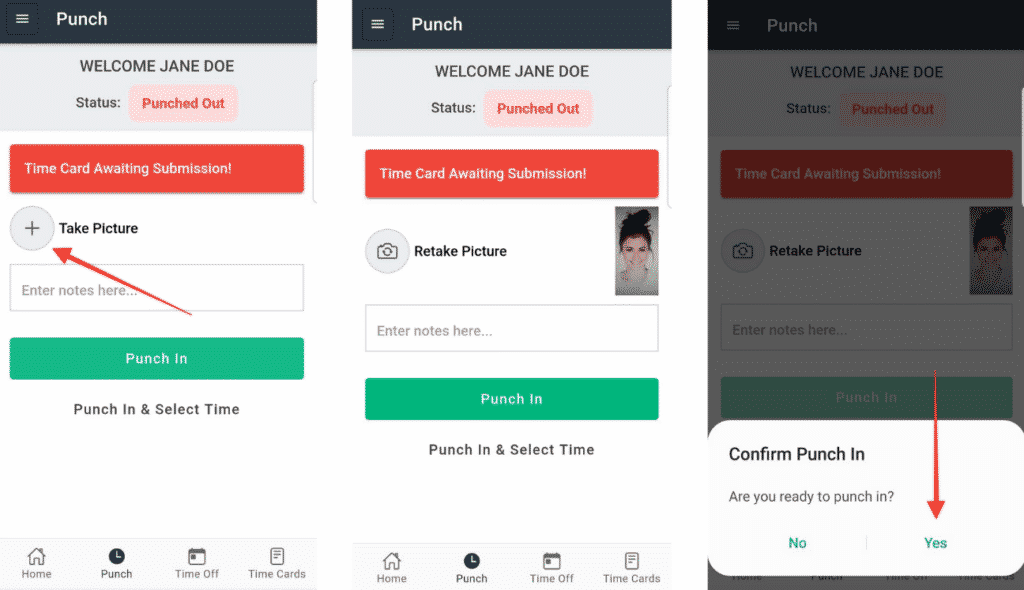
To keep one worker from logging in for another worker, Buddy Punch offers facial recognition software via Photos on Punch.
With Photos on Punch enabled, workers must provide a picture of themselves via a device webcam when they clock in (this can be the camera on their smartphone or tablet). This photo is then automatically compared to the one they have on file via facial recognition technology, ensuring workers, including remote employees, can only log themselves in.
There are other time clock features which can also help prevent buddy punching, such as Geofencing and IP Address Locking, which we discuss next.
Geofencing
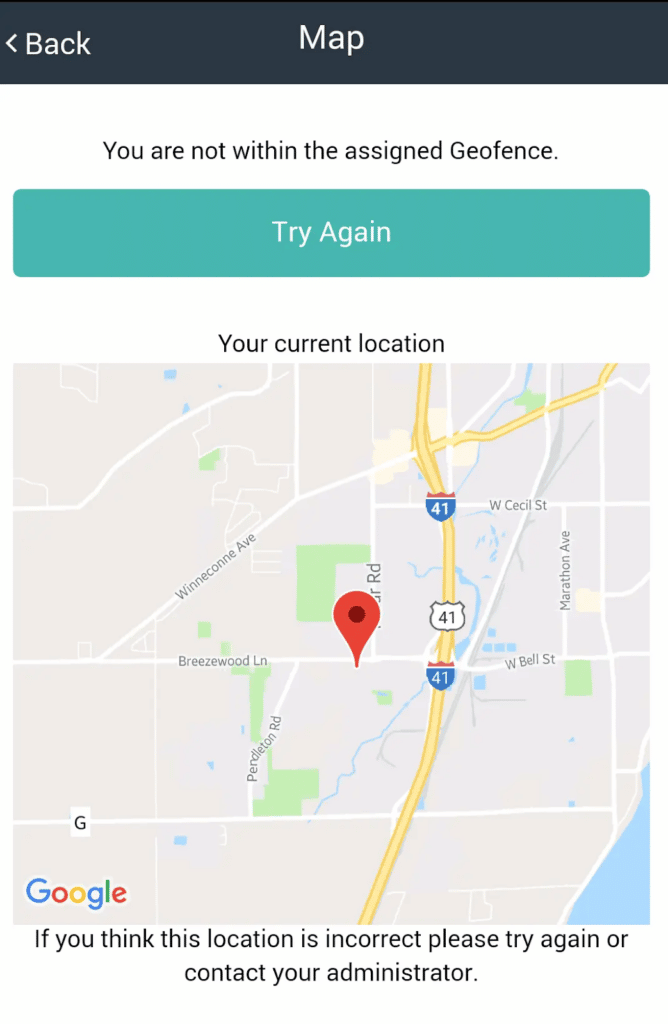
With geofence time tracking, you can enter the GPS coordinates of multiple workplace locations, then designate a geographic radius employees must be within.
When employees log in, the software compares their coordinates to that of their workplace. If they try to clock in from outside the radius, they’ll be prompted to try again when they get closer. Since each login attempt comes with GPS coordinates, this deters both buddy punching and absentee punching.
IP Address Locking
Buddy Punch lets you specify an IP address workers need to log in from (for instance, the IP address of your workplace). Since employees can’t log in from IP addresses other than what’s designated, they have to be at work to sign in.
Multiple IP addresses can be designated, making this tool useful for companies with multiple work locations.
How to Prevent Unrecorded Breaks
Employees are legally entitled to break time under American employment laws like the Fair Labor Standards Act (FLSA); even if this weren’t true, breaks are good for employee productivity. The problem is when unpaid or extended breaks are credited as hours worked. Buddy Punch addresses this through its Automatic Break Rules.
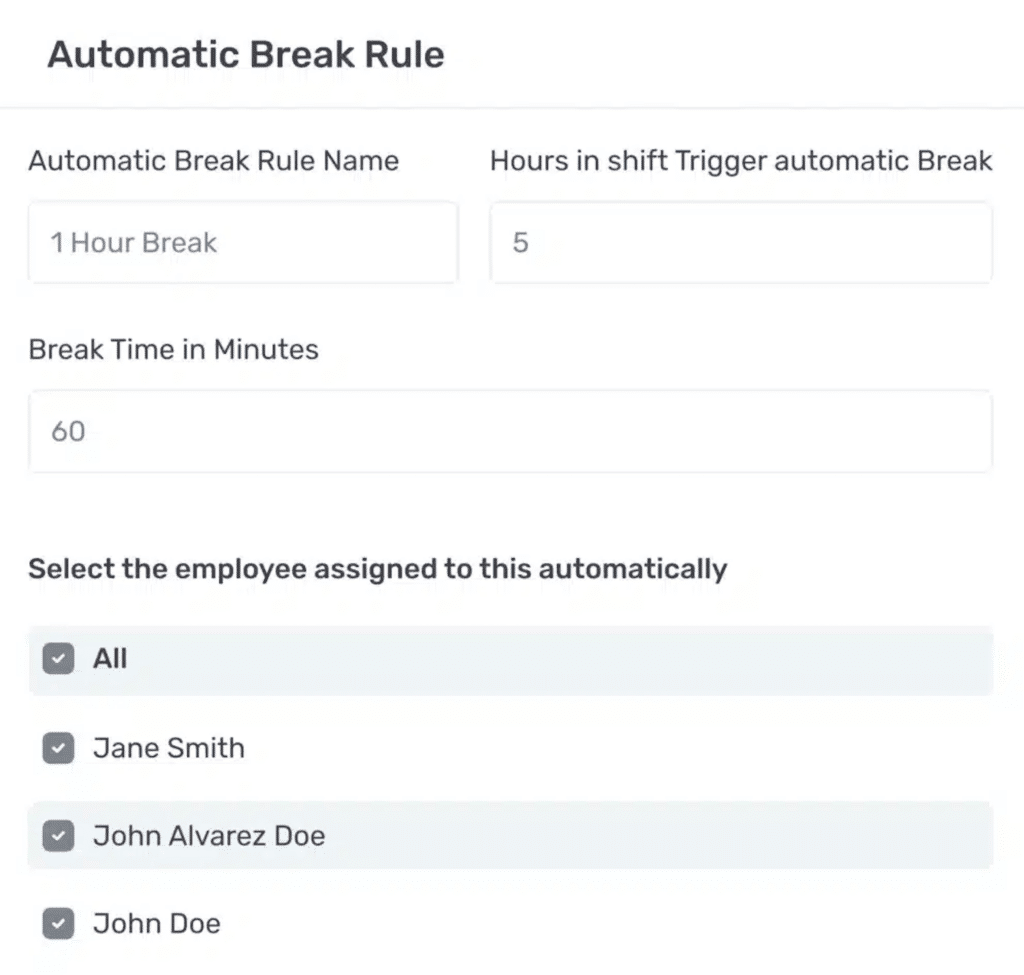
With this tool active, breaks automatically kick in after employees have worked a certain amount of time; for instance, employees might receive an hour-long lunch break after five hours of work.
Since employees don’t have to clock in and out for every break, this improves accuracy by removing human error. It also increases transparency for employees, letting them know how many breaks they’re entitled to throughout the day.
How to Set Up Punch Rounding
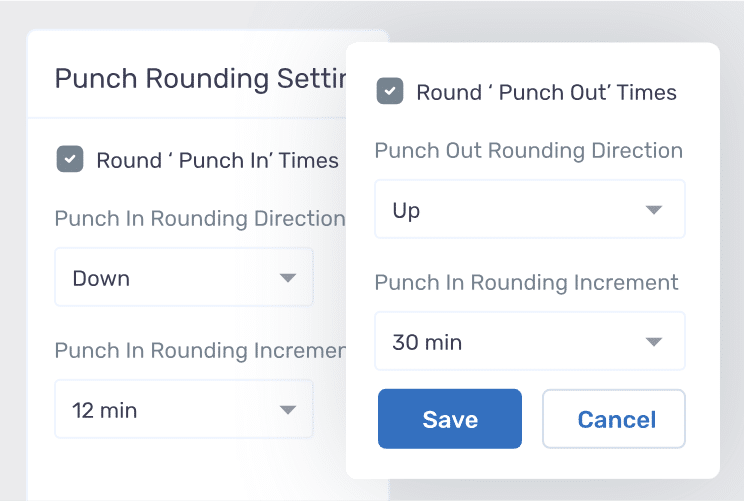
When employees log in and out, they may round the time to the closest hour. This is called punch rounding. In the absence of clear policies, workers may inadvertently steal time by rounding their times to before they came in and after they clocked out. Buddy Punch removes this possibility by automatically rounding punches according to a consistent set of rules.
Within the punch rounding menu, you can decide the increment by which you want to round, and whether clock-in or clock-out times should favor workers (legally, one of these times must favor workers while the other favors the employer to prevent both time and wage theft). This ensures everyone is on the same page, and once it’s set up, it requires no further input.
How to Prevent Unauthorized Overtime
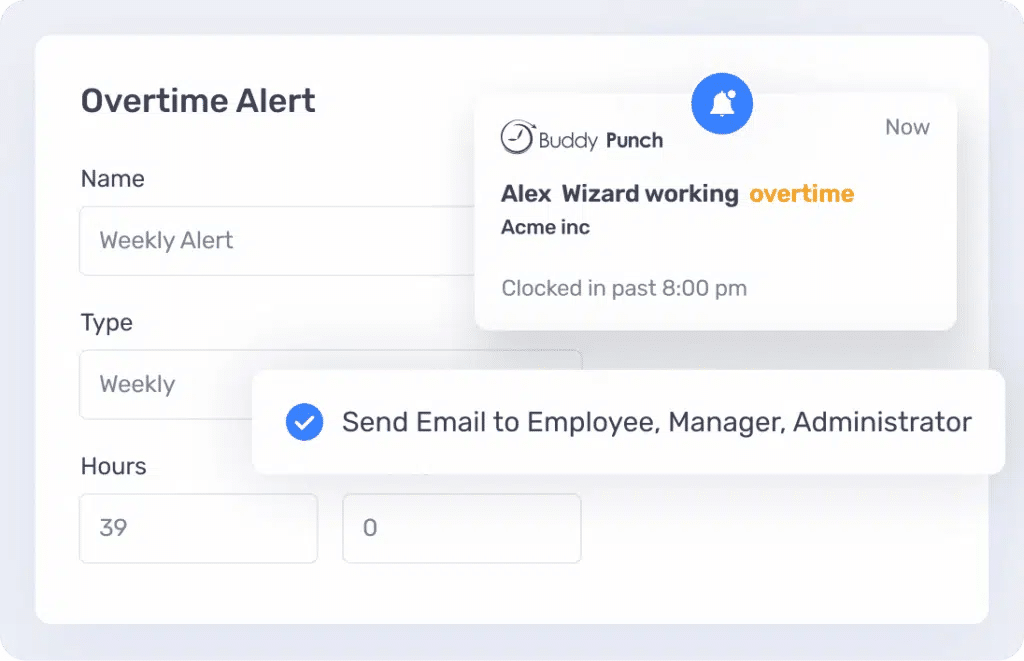
When employees steal time, it’s often accidental — and one of the best examples of this is unauthorized overtime. Employees may be rushing to meet a tight deadline, or they may simply lose track of their work hours. Nevertheless, since overtime pay is generally greater than regular pay, this can be considered a form of time theft.
To prevent this situation, Buddy Punch can send alerts when an employee is approaching overtime. This gives the employee the chance to clock out, and it also lets managers and administrators rearrange the schedule to keep things on track.
How to Prevent Inaccurate Timecards
No matter how many precautions are in place, mistakes happen. Sometimes these mistakes lead to inadvertent time theft. For instance, if an employee forgets to clock out until after they’ve left work. Luckily for everyone, Buddy Punch allows you to quickly edit timecard errors.
First, select the employee whose timecard needs adjusting:
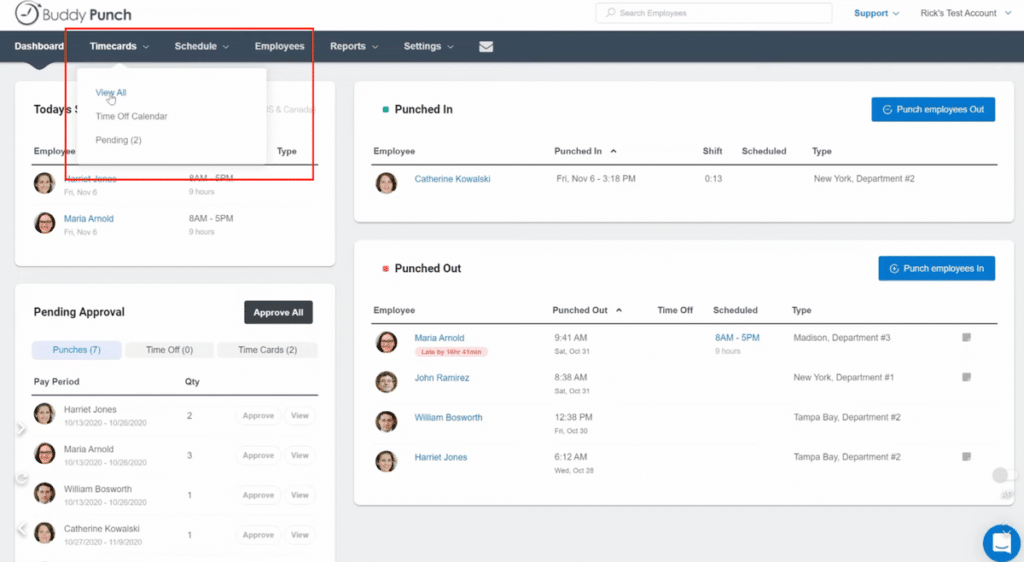
Second, fix the erroneous work hours:
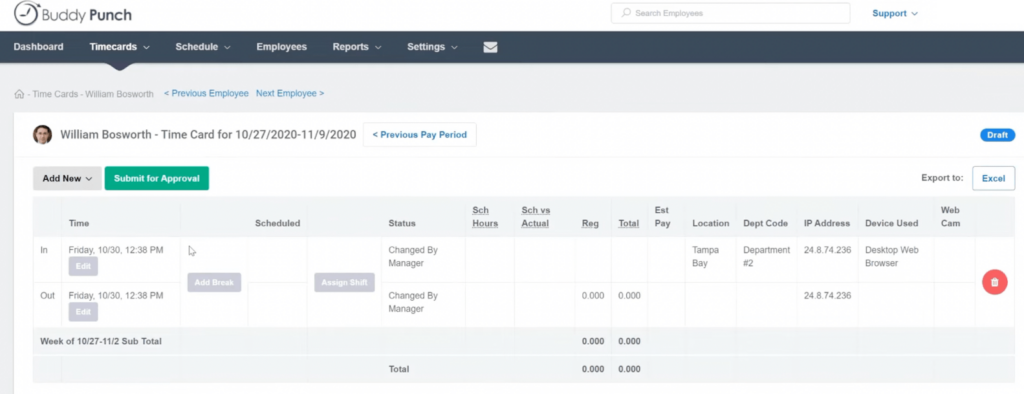
With Buddy Punch, it’s that simple.
Whenever time cards are edited, an alert is generated with details of what was changed. This transparency prevents both time and wage theft.
How Proper Scheduling Can Help Prevent Time Theft
Inadvertent time theft is most likely to happen when people are confused about schedules. Maybe an employee leaves before the end of their shift, or maybe they don’t show up because they were supposed to have some personal time. Buddy Punch removes this uncertainty via its scheduling tool.
Employee Availability
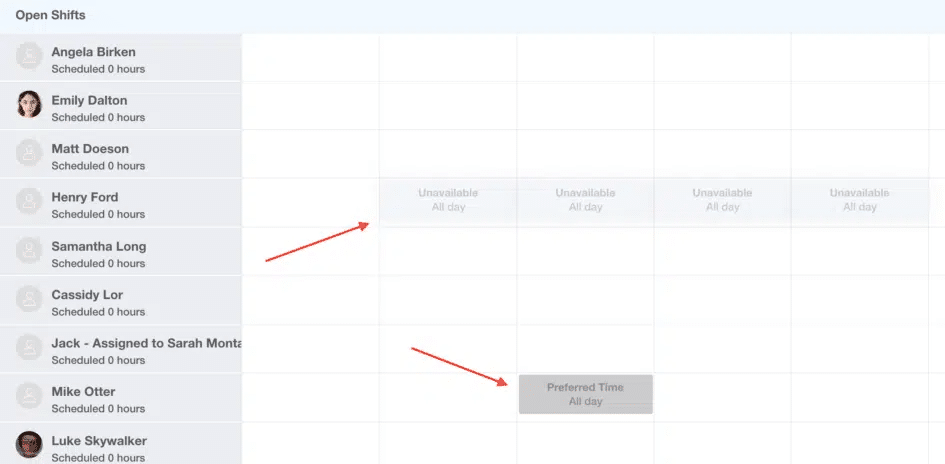
Managers and admins can create schedules and schedule templates via a drag-and-drop calendar interface. Within this view, they can also see employees’ self-reported availability, preventing scheduling conflicts.
Once a schedule is created, push notifications are sent to employees, ensuring everyone knows exactly when they need to show up for their workday.
Shift Trading
Whether it’s an oversight or an emergency, sometimes employees can’t make their scheduled hours. If you don’t have a system in place, this can lead to buddy punching or absentee punching. With our system, workers can trade shifts, quickly finding replacements for each other. Trades are then sent to supervisors for approval, keeping everyone in the loop.
Other Key Features of Buddy Punch
While Buddy Punch’s powerful timekeeping and scheduling tools make it well-suited to counteract employee time theft, it has many more features, including:
- PTO accrual: You can set up rules for how employees accrue paid time off based on work hours (and Buddy Punch will track it). Employees can also request PTO through self-service portals.
- Payroll software: Use this option to calculate wages directly from hours worked, automatically have taxes accounted for, and set up direct deposit for employees.
- Integrations with payroll systems: Buddy Punch also allows you to integrate with your current payroll system, making sure you’re paying your team accurately.
What Customers Are Saying

As of this writing, Buddy Punch has 4.8 out of 5 stars on Capterra (a popular software review site) based on 850+ reviews.
Here’s what our clients have to say about our time clock software:
“I used Google Sheets before, so this is quite a bit more efficient and keeps employees honest.”
Click here to read the full review.
“I love the facial recognition feature and other features that are offered to ensure that your staff is on the job site in order to sign in.”
Click here to read the full review.
“We mainly use BuddyPunch for the time clock feature and use the GPS feature to track where our employees clock in and out since they do so at a remote site. The feature is accurate and is easy to use on our employees phones.”
Click here to read the full review.
“We have been using Buddy Punch since 2015… as a time clock for daily in/out and breaks…. Buddy Punch is easy to use and easy to figure out. Customer service is responsive.”
Click here to read the full review.
You can see all of Buddy Punch’s Capterra reviews here.
FAQs
What counts as time theft?
Any situation in which an employee receives more pay than they’re due for hours worked is considered time theft. One example is when employees were paid even though they weren’t working; for instance, if they were absent or if they were scrolling social media on company time. It also applies to situations when employees are overcompensated for work they did do, such as when they engage in unauthorized overtime.
Is time theft illegal?
Though the U.S. doesn’t currently have federal laws governing it, time theft can be considered a type of employee theft. Because of the legal gray area, business owners are typically in charge of deciding what disciplinary actions to take. Employees caught stealing may lose their full-time job and have to return the portion of wages they didn’t earn.
How can you catch when employees steal time?
Time tracking systems can allow you to document the number of hours employees are at their workplace, particularly if the apps include accountability tools like geofencing or biometric verification. More subtle methods of stealing time, like taking too many breaks or completing personal tasks, can be caught by using more invasive methods to monitor employees like security cameras, keyloggers, or old-fashioned spying. This likely isn’t worth the cost of eroding employee morale and trust.
How should you respond to employee time theft?
Responding to employee time theft depends on a number of factors: how much time was stolen, whether it was a one-time or ongoing offense, and whether it was intentional or accidental. For occasional and accidental offenders, check-in and offer support for better tracking and managing their time. For deliberate repeat offenders, thoroughly document their theft and confer with Human Resources before initiating any disciplinary procedures.
Are there ways to prevent time theft?
Transparent schedules, user-friendly time tracking systems, and supportive work environments deter time theft. So does having a clear company policy on employee time theft and its consequences in your employee handbook. Since time theft is often inadvertent, this type of open communication is essential for building trust and cooperation.